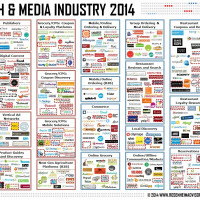Guest post by Brendan Marshall, CEO and co-founder of Kitchit. The views expressed here are solely those of the author, and do not reflect the views of Food+Tech Connect.
I started Kitchit with Ian Ferguson, one of my best friends from Stanford. We set out to pioneer a new category in dining that brought the restaurant experience into your home. By blending the convenience of a restaurant with the intimacy of your home we came to see the impact of bringing people together through a higher quality experience. We came to see how Kitchit is strengthening the quality of our community through the power of the dining experience. We are just getting started in connecting communities throughout the world and accelerating our vision after raising $7.5M from Javelin Venture Partners.
When Food+Tech Connect asked me to share a few things about being an entrepreneur in the food space, I was excited and humbled. And while I have learned a lot since starting Kitchit, the best part is knowing how much lies ahead. Surrounding myself with mentors has made the journey much easier. These leaders have given back to new entrepreneurs by sharing what they learned the hard way. Here are some of the best food startup lessons they shared with me that I’m hoping will benefit you, as well:
It’s a Marathon Not a Sprint
Two mentors shared this with me on independent occasions. I always kept it in mind, and it proved to be correct. When you first start out you will get lost in a quicksand of tasks. The faster you try to get them done, the deeper you fall behind schedule. If you try to outrun it, you’ll lose. Instead, you have to learn to keep a steady pace. This forces you to prioritize and focus on what actually matters. You are more mindful of where the business is going, and the entire team will benefit from that. Move quickly, but always at your own pace.
Your Vision is Your DNA
Great, you have a business idea. But what’s the vision? Let’s assume your company is a success. How will you impact the world? If you understand why and how you want to impact the world, you will understand your values and DNA as a company. Verbalize these ideas and never deviate from them. If you stay true, you’ll have a dedicated team all focused on the same mission.
Know Their Rules, Play By Yours
For the most part, investors had to fundraise just like you. That means they sold their investors on a vision. That dictates the amount of money they invest, what types of companies they invest in and the type of industries they will consider. It also dictates the type of partners they bring on and how those people see success. When you go out to fundraise you need to find your match. That means you aren’t going to click with everyone, it’s simply not designed that way. You have to know your strategy about what you are building and why you are the person to do it. If they want to take you in a new direction, you steer them right back on your track or get off theirs. It simply means you haven’t found your match. Keep looking.
These three pieces of advice all center around one thing: you. You need to know what you are capable of and how you can optimize your skills. You need to know why what you are doing is connected to your life purpose. You need to know why you are going to be successful. If you are starting a company and follow these three rules you will be that much closer to becoming a success and a mentor for future generations.
 Brendan Marshall is CEO and co-founder of Kitchit. Growing up in a family business, studying theology, traveling through India, becoming an investment banker and moving to Palo Alto to go to business school were all profound and very different pieces that made him the entrepreneur he is today.
Brendan Marshall is CEO and co-founder of Kitchit. Growing up in a family business, studying theology, traveling through India, becoming an investment banker and moving to Palo Alto to go to business school were all profound and very different pieces that made him the entrepreneur he is today.
He finds meaning in real connections from experiences that provide memories for years to come. Kitchit is a manifestation of what he has learned and come to believe as what’s most important in our lives, our community.
A California native, Brendan helped start an investment bank out in New York before coming back to the west coast to attend Stanford business school, where he was co-president of the Entrepreneurship Club and started building Kitchit.






